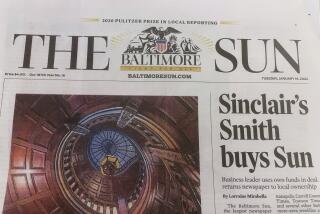Tribune sale faces multiple obstacles
- Share via
Tax liability and government regulations pose obstacles to Tribune Co.’s potential sale of the whole company or individual pieces.
As Chicago-based Tribune began soliciting bids for individual properties this week, a reminder of its vulnerability on the regulatory front came in the form of a challenge to its license-renewal application for KTLA-TV Channel 5.
Media Access Project, a Washington-based public policy law firm, filed a petition late Wednesday with the Federal Communications Commission to block renewal of the eight-year license, which expires Dec. 1, on grounds that Tribune is violating a 1975 rule barring ownership of a newspaper and a TV station in the same market. Tribune also owns The Times.
Similar situations exist in New York, where Tribune owns Newsday and WPIX-TV, and in Hartford, Conn., where it owns the Courant and WTIC-TV. Licenses for WPIX and WTIC expire June 1 and April 1, respectively.
In a filing in August to renew its license for KTLA, Tribune asked the FCC for a permanent waiver of the cross-ownership rule or, failing that, a temporary waiver until the agency finished its review of the rule. Without a waiver, any buyer of Tribune would be in potential violation of cross-ownership rules.
Meanwhile, the tax issue was highlighted in a report Thursday by a Merrill Lynch analyst who said that even if there were a robust market for each of Tribune’s 11 newspapers, 25 TV stations, Chicago Cubs baseball team and other assets, taxes would lop off as much as $5 billion -- about $20 a share. At her estimate of $57 a share, that would leave the total value at about where the stock is trading now.
Tribune shares closed Thursday at $32.26, down 36 cents, the fifth consecutive decline.
Since Tribune announced a strategic review of its options for boosting the stock price Sept. 21, four groups of private-equity companies have emerged as potential bidders for the whole company, according to sources familiar with the process who asked not to be named because the process was private. No media companies made bids.
The bidding ended Friday, and sources said the nonbinding offers were in the low to mid-$30s a share, close to the current stock price.
Consequently, these sources said, Tribune’s investment bankers began inviting people who had expressed interest in individual properties to bid.
People who think Tribune shares are undervalued say there are ways of structuring asset sales so that the tax bite would be far less than the $5-billion estimate by Merrill analyst Lauren Rich Fine.
“We think she’s too gloomy,” said Charles W. Bobrinskoy, vice chairman of Chicago-based Ariel Capital Management, which holds 6% of Tribune’s shares in its mutual funds.
One way to facilitate an asset sale without a big tax hit is a so-called reverse Morris Trust, a multistage transaction that occurs over a couple of years, said tax expert Robert Willens, a Lehman Bros. managing director.
For example, Tribune could spin off to shareholders a new company containing The Times. A buyer would acquire less than 50% of the new company’s stock but enough to take management control. After two years, the buyer could make an offer for the rest of the company. To make the deal tax free, the later buyout must “be a totally independent event from the original transaction,” Willens said.
Tribune knew it would be creating cross-ownership situations in 2000 when it bought Times Mirror Co., owner of The Times, the Courant and Newsday. But it “made a multibillion-dollar bet that the rules would change,” Media Access Project President Andrew Jay Schwartzman said. The firm wants Tribune to be forced to divest either the newspapers or the TV outlets in cities where there is cross-ownership, arguing that the arrangement deprives the public of diversity of opinion and news programming.
The FCC did relax the cross-ownership restrictions in June 2003 but was promptly sued, and a court injunction kept the new rules from going into effect. In 2004, the U.S. 3rd Circuit Court of Appeals in Philadelphia ruled that the FCC was free to relax the restrictions but that its methods were flawed.
The court ordered the FCC to rework its rules, which is where things stand today.
Shaun M. Sheehan, Tribune’s vice president for Washington affairs, said Thursday that the rule was archaic, dating to a time when cable TV was in its infancy, before the Internet.
james.rainey@latimes.com
*
Staff writer Jim Puzzanghera contributed to this report.
More to Read
The biggest entertainment stories
Get our big stories about Hollywood, film, television, music, arts, culture and more right in your inbox as soon as they publish.
You may occasionally receive promotional content from the Los Angeles Times.











